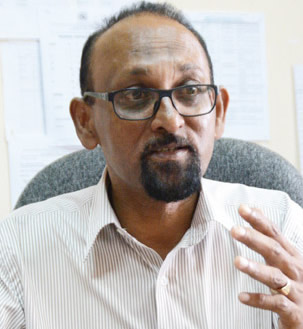
The final school term is here and students will soon sit for exams. Stress, anxiety, blackout, students are often victims of overworking during the 3rd term. What are the ways through which our youth can prevent overworking? News on Sunday provides an insight into the matter by consulting with experts in the field about how students should tackle the 3rd term serenely.
Psychologist Dr Anjali Bungaleea explains that in order to prevent overworking during the 3rd term, the student should start with a proper time management. “That is, set up a timetable for study. Chronologically, jot down dates of all forthcoming exams and organize accordingly. A multi-fold and multi-faceted approach is as followed: From day 1, ensure that all classwork, homework and assignments are wrapped up. Adopt the habit of casually reviewing lessons before bedtime. Practice being ‘in the moment’ during class and stay attentive by writing down key words. Have the courage to always ask questions instead of playing dummy with teacher’s explanations, participate fully in all class discussions, as they are likely to provide expanded and diverse perspectives.”
She states that the student must understand that preparation for the 3rd term examination starts from day 1 of the semester calendar so as to avoid cramming to burn the midnight oil at the last minute. “It is advisable to transcribe core materials, like definitions, terminologies, nomenclatures, formulas, diagrams, among others, into index cards, say 4x3 pocket sized for portability, to facilitate learning-on-the-go with self-quizzing all now and then.” Most important, she highlights, the student should “spend at least one hour per day with past exam series to familiarise thoroughly with all the common exam verbs often used by examiners.”
Dr Bungaleea explains that psychology lays emphasis on the mind, body and spirit balance. “That is via practicing some simple relaxation sequences, with slow but deep diaphragmatic breathing routines, to help the mind from distracting thoughts and create a resourceful and superior state of mind, leading to a physiologically relaxed body posture.”
The psychologist also states that it is vital for educators and parents to recognize the significant impact overwork has on students. “They must work to create a supportive and calm educational environment. School administrators who want their students to succeed academically should conduct regular check-ins with students and direct students to educational psychologists when necessary and educate families about the negative impact of stress on students,” she trusts. She adds that the “class teacher and parents altogether should provide constant support to identify, tackle and monitor any source of stress. A strong support system (whether emotional or practical) is essential to achieve academic goals.”
According to the pedagogue and president of the Union of Rectors of State Colleges (Association des recteurs des collèges d’Etat), Soondress Sawmynaden, the best way to prevent overworking is to do regular revisions. “Revision has to be a regular feature throughout the year and should not be kept for the last minute. For the exams, they need to concentrate more on areas where they have difficulties and come up with a well prepared plan. They could try to mix revision with relaxing activities and avoid wasting time on unnecessary distracting activities. They need to eat regular meals, sleep for at least seven to eight hours and take breaks as and when needed.”

He trusts that it is not advisable to take tuition on exam days. “This may cause a lot of confusion in their minds. Learning at the last minute may upset all the thinking processes of the students. Teachers as well should not encourage students to take tuition on exam days but rather inspire them to learn and revise regularly throughout the year.”
Students often have consecutive exam days. In order not to overwork themselves, Soondress Sawmynaden trusts that students need rest. “It is very important that after exams, the students need to take some rest and forget what is already over. Once the body and the mind feel good, students may then just have a light revision on what is expected of them in the coming exams.”
He also underlines that it would be a real waste of time and energy for a student to test at home an exam paper he has just sat for. “This might breed more stress and anxiety, which will have a negative impact on the coming exam papers. They just need to put the paper aside and rather concentrate on what’s coming next.”
Causes of overworking
Dr Bungaleea explains that students generally experience eustress during 3rd term examination. “Eustress means beneficial stress, mostly psychological. Eustress is a type of stress that is actually important for us. Without which, students would become bored at best and, in more serious cases, depressed with a lack of motivation to accomplish goals and a lack of meaning in life without enough eustress. Not striving for goals, not overcoming challenges, not having a reason to wake up in the morning would be damaging to every one of us,” explains the psychologist.

However, she underlines that when on verge of final exams, students are on wake-up call, and persevere to aim for good grades, which culminates in overworking. “Exam stress affect both struggling students as well as high-achievers equally. However, when a student turns frustrated by a lack of proper academic planning, it makes it harder for the latter to achieve desired milestones, resulting in over-working. This causes a stressful cycle where modules pile up and the student experiences time-management challenges with a climax to even more stress.”
She adds that clustering months of lessons within a short lapse of time outweighs quality study pattern. “Academic lessons are to be learned not only via classworks, homeworks, tuitions and self-reading but also via active participation throughout, for example, for many students, the thought of getting called on in class and speaking in front of their classmates can be terrifying. This can be particularly true if a particular student is struggling to keep up in a subject or an area.”
She trusts that students ought to master good organizational skills to experience eustress instead of distress. “Causes of overworking during 3rd term examination more so sums up to the fact that students are left with no free time to relax. As a student progresses from 1st to 3rd term throughout an academic year, the amount of workload and difficulty level to master class notes increases, and obviously students without good time management skills can experience even more stress.”
Soondress Sawmynaden, on his side, utters that students these days tend to spend and waste much of their precious time on the social media during the whole year. “They believe that they would be able to recover the wasted time at the end of the year. Unfortunately, this is very much impossible. It is similar to a person who avoids eating for a whole week and believing that he could eat all that has not been eaten at the end of the week – again impossible.”
For him, the main reason of overworking is that “students who do not work regularly and continuously during the whole year will obviously find themselves overworking at the end of the year. Coupled with this, most students take private tuition and thus do not find much time left to revise regularly and they end up becoming adepts of procrastination.” He adds that notwithstanding the above, “parents as well tend to show concern only during the last term and very often this puts much more pressure and stress on the students at the eleventh hour, which creates a situation where they overwork to satisfy the expectations of their parents.”
Consequences of overworking
A major cause of overworking, highlights Dr Bungaleea, is being negligent on amount of sleep. “As a result, this makes it difficult for students to concentrate and learn effectively. This can lead to feelings of stress for with an inability to perform at one’s utmost best level. It is essential to know that students who deprive themselves from 8-10 hours of sleep each night are more likely to feel stressed than those students who have good 24 hours planning.” The psychologist explains that there is a link between overwork and poor sleep. “Poor sleep makes stress management more difficult, while also negatively impacting on concentration, learning, listening, memory and problem-solving.”

She adds that overworking affects a student at various levels. “Overworking has an impact on the physical, psychological, emotional, intellectual and academic performance of students, mainly for students the cognitive effects of stress (e.g., attention, concentration) on academic success is jeopardised.” She trusts that overwork may be the culprit for students who are prone to bullying others. “Based on the fact that overworking increases feelings of irritability and anger, which increases the likelihood for angry outbursts and social withdrawal. Besides directing anger at other students, those who experience overwork may be resistant to following school guidelines and respectfully engaging with instructors. They may also exhibit disrespectful behaviour. Worst stage of overstress can result in the student to drop out of school.”
The pedagogue Soondress Sawmynaden trusts that overworking may lead to various issues. “First burnout, resulting very often in blackout during exams, second is demotivation, a third issue is exhaustion due to lack of sleep, then lack of concentration during exams and fifth breakdown.”

Case studies of students overworking
Psychologist Dr Anjali Bungaleea states that being a practicing psychologist for the past 12 years, she has been encountering numerous students with acute anxiety disorder due to overworking during exam period. “Consequence of academic impairment often branch from wrong choice of subjects chosen at college level, or inability to express choices in choosing specific study field. Such cases have serious implications in studies in several ways. The students feel consistently in a state of anxiety, and at times have panic attacks, which can have lasting effects.”
She provides the example of one particular case wherein a student found it difficult to leave her house. “She developed into an extremely introvert character, hated busy places such as the student union and family gatherings. The situation transited from mental trauma to physical manifestation such as having difficulties in following lecture slides due to sudden blurred vision. By the middle of her 3rdsemester, she nearly left the course altogether, as alongside the above difficulties, she started feeling unable to concentrate on her coursework, even at home within her familial setting, which impacted on her examination results.” Dr Bungaleea highlights that psychological sessions for such cases focuses on stress and coping, meaning-making, stress-related growth, health psychology, goal setting and emotional intelligence testing.
Dr Naazim Mohungoo, on his side, discusses a recent case where a young girl was referred to him due to concerns around her mood and self-harm. “While she was generally a good student and had a good social circle and family support, the family were devastated to hear that she was self-harming and had a meltdown in school. She reported that she always used to do well in school and that she was happy when she brought good grades in, which made her parents proud. However, she did badly in three areas in a test and she was devastated. She felt that she had let everyone down, that there was no way she could get her grades back up, and this created a circle of anxiety and self-doubt. The only way she felt she could get out was to self-harm and maybe even consider ending her life.”
Consequence of academic impairment often branch from wrong choice of subjects chosen at college level, or inability to express choices in choosing specific study field. Such cases have serious implications in studies in several ways.
He adds that “this is the type of issues that can bring a lot of problems to a child if they do not feel they have enough support, or feel they are pressurized to get good results, despite there being no evidence of her parents putting pressure.” Dr Mohungoo trusts that “the pressure is from the system, it is perceived and is permeating all layers of our education system. While we do have a lot of speeches against overworking, our system and culture continues to promote it.”
 J'aime
J'aime













